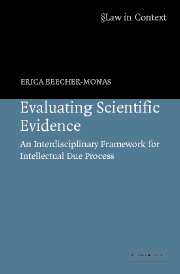Book contents
- Frontmatter
- Contents
- Acknowledgments
- Evaluating Scientific Evidence
- Introduction
- 1 Triers of science
- 2 What is intellectual due process?
- 3 A framework of analysis
- 4 Toxic torts and the causation conundrum
- 5 Criminal identification evidence
- 6 Future dangerousness testimony: The epistemology of prediction
- 7 Barefoot or Daubert? A cognitive perspective on vetting future dangerousness testimony
- 8 Future dangerousness and sexual offenders
- 9 Models of rationality: Evaluating social psychology
- 10 Evaluating battered woman syndrome
- Conclusion
- Index
- The Law in Context Series
9 - Models of rationality: Evaluating social psychology
Published online by Cambridge University Press: 04 December 2009
- Frontmatter
- Contents
- Acknowledgments
- Evaluating Scientific Evidence
- Introduction
- 1 Triers of science
- 2 What is intellectual due process?
- 3 A framework of analysis
- 4 Toxic torts and the causation conundrum
- 5 Criminal identification evidence
- 6 Future dangerousness testimony: The epistemology of prediction
- 7 Barefoot or Daubert? A cognitive perspective on vetting future dangerousness testimony
- 8 Future dangerousness and sexual offenders
- 9 Models of rationality: Evaluating social psychology
- 10 Evaluating battered woman syndrome
- Conclusion
- Index
- The Law in Context Series
Summary
Social psychology is suddenly an important argument in law. Increasingly, references to framing effects, hindsight bias, overconfidence, and optimism bias, to name just a few, are pervading the legal literature. Occasionally, such references even creep into court opinions. Jury studies and eyewitness unreliability studies are the subject of admissibility disputes. Behavioral studies are cited as support for everything from antitrust reform and environmental reform to failures in the securities markets. In large measure, this use of social psychology is intended to counter the pervasive influence on legal scholarship (and jurisprudence) of the law and economics movement.
The use of social science for legal argument is by no means a bad thing because it reflects a growing awareness that law can become more effective by using scientific insights into human behavior. However, to properly apply these insights, legal actors (i.e., scholars, judges, and lawyers) need to be intellectually careful to minimize the risk of abuse. With little analysis of the research on which it is based, thousands of legal articles have cited to various aspects of social psychology as though it were accepted dogma, like the laws of thermodynamics. Worse, these legal scholars occasionally attempt to replicate psychological experiments in their own classrooms (and cite such findings as support for their arguments) without any of the benefits of scientific process. Partly because the social psychology research on which they relied was not well integrated with biological knowledge, legal use of social psychology has been woefully unsophisticated.
- Type
- Chapter
- Information
- Evaluating Scientific EvidenceAn Interdisciplinary Framework for Intellectual Due Process, pp. 168 - 202Publisher: Cambridge University PressPrint publication year: 2006

